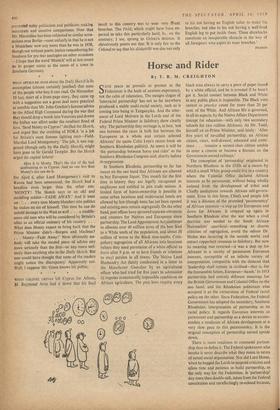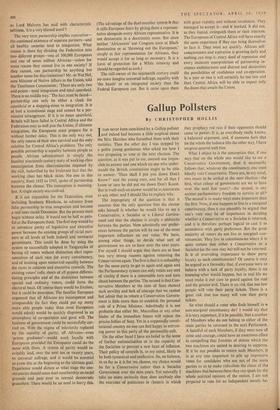Horse and Rider
By T. R. M. CREIGHTON SUCH peace as prevails at present in the Federation is the hush of anxious expectancy, not the calm of relaxation. The meagre slogan of 'interracial partnership' has not so far anywhere produced a stable multi-racial society, such as is coming into being in Tanganyika. And the utter- ances of Lord Malvern in the Lords and of the Federal Prime Minister in Salisbury show clearly why. The partnership they envisage is, at best, 'not one between the races in bulk but between the Europeans as a whole and certain selected Africans' (to quote Colin Leys's recent book on Southern Rhodesian politics). At worst it will be `the partnership between horse and rider' as the Southern Rhodesian Congress said, shortly before its suppression. SUCH peace as prevails at present in the Federation is the hush of anxious expectancy, not the calm of relaxation. The meagre slogan of 'interracial partnership' has not so far anywhere produced a stable multi-racial society, such as is coming into being in Tanganyika. And the utter- ances of Lord Malvern in the Lords and of the Federal Prime Minister in Salisbury show clearly why. The partnership they envisage is, at best, 'not one between the races in bulk but between the Europeans as a whole and certain selected Africans' (to quote Colin Leys's recent book on Southern Rhodesian politics). At worst it will be `the partnership between horse and rider' as the Southern Rhodesian Congress said, shortly before its suppression.
In Southern Rhodesia, partnership so far has meant on the one hand that Africans are allowed to buy European liquor. This month for the first time in history they are legally recognised as employees and entitled to join trade unions. A limited form of home-ownership is possible in some urban locations and multi-racial hotels are allowed by law (though none has yet been opened and existing ones remain segregated). On the other hand, post offices have sprouted separate entrances and counters for Natives and Europeans since partnership. The Land Appointment Act continues to allocate over 40 million acres of the best land to a White tenth of the population, and about 38 million of worse to the Black nine-tenths. Com- pulsory segregation of all Africans into locations (where they need permission of a white official to leave after 9 p.m. or to have friends or relations to stay) persists in all towns. The Native Land Husbandry Act (lately condemned in a letter to the Manchester Guardian by an agricultural officer who had tried for five years to administer it) imposes economically impossible conditions on African agriculture. The pass laws require every black man always to carry a piece of paper issued by a white official, and he is arrested if he hasn't got it, Social contact between Black and White in any public place is impossible. The Black vote cannot in practice count for more than 20 per cent. of the White. And •African life is governed, in all its aspects, by the Native Affairs Department (except for education—with only two secondary schools for two million Africans). As Mr. Todd, himself an ex-Prime Minister, said lately : 'After five years of so-called partnership, an African citizen, clean, well-dressed, educated and ambi- tious . . . remains a second-class citizen unable to enter a cinema or become a fireman on the Government-owned railways.'
The conception of `partnership' originated in Northern Rhodesia in the 1920s as a means by which a small White group could live in a country where the Colonial Office declared African interests to be paramount, without being wholly isolated from the development of tribal and Chiefly institutions towards African self-govern- ment. Even in this form, Chiefs and people felt it was a dilution of the promised 'paramountcy' of African interests—a step up for Europeans and down for Africans. It cropped up again in Southern Rhodesia after the war when a rival doctrine was needed to the South African Nationalists' apartheid—something to disarm criticism of segregation, avoid the odium Dr. Malan was incurring in the outside world, and attract copperbelt revenues to Salisbury. But now its meaning was reversed—it was a step up for Africans in a society of paramount European interests, susceptible of an infinite variety of interpretation, compatible with the demand that 'leadership shall remain in civilised—that is, for the foreseeable future, European—hands.' In 1953 partnership had entirely different meanings for the British Government and Colonial Office on the one hand, and the Rhodesian politicians who accepted it as the cornerstone of Federal racial policy on the other. Since Federation, the Federal Government has adopted the secondary, Southern Rhodesian, interpretation of partnership as its racial policy. It regards European interests as paramount and partnership as a device to accom- modate a modicum of African development at a very slow pace to this paramountcy. It is the original conception of partnership turned upside down.
There is more readiness to commend partner- ship than to define it. The Federal spokesmen who invoke it never describe whit they mean in terms of actual social organisation. Nor did Lord Home, when he begged the Lords to suspend criticism and allow time and patience to build partnership, as the only way for the Federation. Is 'partnership' any more than double-talk, taken from the Federal constitution and unrefiectingly re-echoed because, as Lord Malvern has said with characteristic saltiness, 'it is a very blessed word'?
The very term partnership implies separation— the continued existence of separate partners—and all healthy societies tend to integration. What reason is there for dividing the Federation into two different groups—one of 300,000 Epropeans and one of seven million Africans—unless for some reason they cannot live in one society? If they cannot, can partnership be anything but another name for discrimination? Mr. de Wet Nel, now Minister of Native Affairs in the Union, told the Tomlinson Commission : 'There are only two end-points—total integration and total apartheid. There is no middle way.' The fact must be faced— partnership can only be either a cloak for apartheid or a stepping-stone to integration. It is at best a transitional stage and cannot be a per- manent arrangement. If it is to mean apartheid, Britain will have failed in Central Africa and the Federation may as well join the Union; if ultimate integration, the Europeans must prepare for it without further delay. This is the only way out, the only means of their own survival and the only solution for Central Africa's problems. The only possible partnership is equality between people as people. African advancement is simply the familiar nineteenth-century story of working-class emancipation from discrimination imposed by the rich, bedevilled by the irrelevant fact that the working class has black skins. No one in this country, from 1832 to 1945, spoke of partnership between the classes. The conception is meaning- less. A single society was evolved.
ICI§ not impossible for the Federation, even including Southern Rhodesia, to advance from false partnership to true integration and become a real inter-racial Dominion. But the process must begin without delay. It would not be half as pain- ful as the Europeans think. The first step would be to introduce parity of legislative and executive power between the existing groups of racial part- ners at all levels of both federal and territorial government. This could be done by using the system so successfully adopted in Tanganyika of having all voters without distinction elect repre- sentatives of each race for every constituency, and of insisting upon numerical equality between the races in cabinets and executive councils. The existing voters' rolls, shorn of all present differen- tiating principles and of the distinction between special and ordinary voters, could form the electoral basis. Of course there would be friction; but it could be overcome. The familiar European argument that all Africans are incompetent and irresponsible (in fact they could put up many more able people today than most Europeans would admit) would be quickly disproved in an atmosphere of co-operation and good will. The business of government could be successfully car- ried on. With the stigma of inferiority replaced by the equality of parity, all Africans—even 'prison graduates'—would work loyally with Europeans provided the Europeans could do the same with them. A system of parity would in- evitably lead, over the next ten or twenty years, to universal suffrage, and it would be essential to avow this at the beginning as the ultimate goal. Experience would dictate at what stage the con- stituencies should cease dual membership on racial grounds and pass over to normal democratic procedure. There would be no need to hurry this. (The advantage of the dual-member system Is that it stills European fears by giving them a represen- tative alongside every African representative. It is not democratic in a doctrinaire sense. But since neither 'Africanism' nor Congress aims at Black domination or at 'throwing out the Europeans,' simply at fair representation for Africans, they would accept it for as long as necessary. It is a form of protection for a White minority and should be regarded as such.) The mill-owner of the nineteenth century could no more imagine universal suffrage, equality with 'the hands' or an integrated society than the Federal Europeans can. But it came upon them with great rapidity and without revolution. They managed to accept it—and it worked. It did not, as they feared, extinguish them or their interests. The Europeans of Central Africa will have exactly the same experience if they can bring themselves to face it. They must act quickly. African self- consciousness and aspiration is growing daily and nothing can stop it; every deed of repression and every insincere interpretation of partnership in- creases embitterment and distrust and diminishes the possibilities of confidence and co-operation. In a year or two it will certainly be too late and then Central Africa will be able to expect only the doom that awaits the Union.















































 Previous page
Previous page